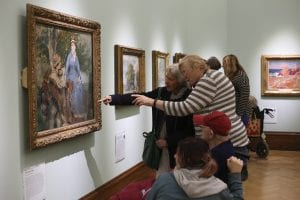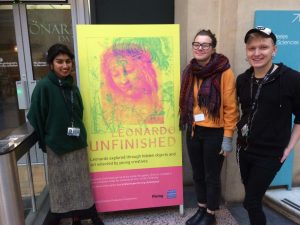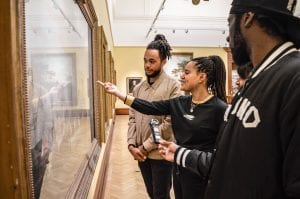Participating in Bristol Museum & Art Gallery: Engaging older and younger audiences
Posted on by Fay Curtis.
by Suzi Wright, Engagement Officer – Young People
The Participation team have had a busy year creating opportunities for older people and young people at Bristol Museum & Art Gallery.
Three projects were delivered; Creative Cafes, Young Exhibition Producers Programme and Uncomfortable Truths. Participants had the opportunity to be inspired, develop new skills and reinterpret some of the collections. Each project was evaluated to measure the impact on both the participants and the museum team. Jenifer Macindoe from Connect The Dots spoke to staff from different teams, stakeholders and participants.
Creative Cafes
 Our Dementia Friendly creative cafes are pop up cafes for people living with dementia. They are funded by the National Lottery Heritage Fund. The cafes have been run in collaboration with the charity Alive and the Dementia Wellbeing Service. Participants are welcomed to the museum. They then visit the galleries to see some of the collections and meet curators and artists.
Our Dementia Friendly creative cafes are pop up cafes for people living with dementia. They are funded by the National Lottery Heritage Fund. The cafes have been run in collaboration with the charity Alive and the Dementia Wellbeing Service. Participants are welcomed to the museum. They then visit the galleries to see some of the collections and meet curators and artists.
Outcomes for the participants
- Participants find they feel happier and more positive after attending the café
- Conversations and interactions have been generated, inspired by the artworks
- Carers, particularly family members, have been able to connect more deeply with the person living with dementia
- Participants were physically active in visiting and exploring the museum
- Participants engaged with the artworks, actively ‘looking’ and drawing out connections and associations
- The project provided the opportunity and space for participants to reflect on the impact of dementia on their lives
‘A lot of things aren’t as easy as they were (for mum) but this has been. It has been a joy for her to engage with the arts again and getting to know others. She is always looking forward to the sessions.’ – Family member attending Creative Café
‘These are experiences to be treasured. This work – what you are doing – is hugely beneficial.’ – Carer attending Creative Café
Outcomes for the museum team
- Making access easy for people was found to be incredibly important. Staff learned this through experience of arranging transport
- High levels of staffing are essential to ensure good participation
- Staff and volunteer development – increased awareness of dementia
- Staff and volunteer enjoyment – making a difference to the participants
- Development of older audience – partnership with care homes and development of an assisted visit
- New and stronger partnerships – Alive, Bristol Dementia Wellbeing Service, Bowes Museum
‘The project opened up our art collection for arts and well-being in a way that we didn’t do before.’ Curator at Bristol Museum & Art Gallery
Health and well-being is a growing area of work for the team. This project has broadened our offer to people with disabilities. To engage with more people of colour, the evaluation proposed that a more universal approach be taken. Delivering creative cafés for older people rather than specifically those with dementia will be most effective in reaching people with dementia from these communities. The Creative Cafes programme continues to run.
Young Exhibition Producers Programme
 The Young Exhibition Producers Programme (YEPP) enabled three young people to put together a complementary exhibition alongside Leonardo da Vinci: A Life in Drawing.
The Young Exhibition Producers Programme (YEPP) enabled three young people to put together a complementary exhibition alongside Leonardo da Vinci: A Life in Drawing.
They looked at objects and art from Bristol Museum & Art Gallery’s collections alongside Leonardo da Vinci drawings from the Royal Collection.
Four themes emerged from their study of Leonardo’s drawings and the museum collection. These themes formed the layout of the exhibition – Beauty and the Grotesque, Thinking on Paper, Under the Skin and The Deluge. The exhibition was called Leonardo Unfinished.
Outcomes for the young producers
- They gained new skills and practice to prepare them for employment
- It improved their motivation or attitude to work
- They found it helped them to improve their confidence to try new things and find out what they are good at
- They found it helped them develop their own artistic practice
- It helped them learn a great deal about interpretation, design, and audiences
- It made them feel more favourably towards museums
‘Being a YEP has grown my confidence and taught me how to deal with working within an institution. The challenges you can face…has allowed me to grow and seek ways to find a different approach to solve a problem.’ – Young Exhibition Producer
Outcome for the museum team
- The YEPP programme has started conversations around the risks that can be taken with exhibitions
- Staff developed a better understanding of how to approach co-produced projects in future and the key principles
- It strengthened the museum team through collaboration between different departments
- An exciting exhibition to present to the public – not the standard narrative
- Increased commitment to working with young people and exploring more opportunities for apprenticeships
‘I think what they’ve done is great, they’ve looked at it fresh in a way that we couldn’t have done as an institution.’ – staff member at Bristol Museum & Art Gallery
This project has prompted reflections and initiated conversations within the organisation. This has resulting in a clear commitment to develop young people’s voice within the museum displays. It also demonstrated that visitors want the museum to collaborate more with young people.
Uncomfortable Truths
 During 2019, 14 young people took part in a project to create enhanced interpretation around six of Bristol Museum & Art Gallery’s objects. They were all students or alumni of the University of West of England (UWE). The students aimed to uncover uncomfortable truths behind each object.
During 2019, 14 young people took part in a project to create enhanced interpretation around six of Bristol Museum & Art Gallery’s objects. They were all students or alumni of the University of West of England (UWE). The students aimed to uncover uncomfortable truths behind each object.
How were they collected, what did they represent and what were the difficult pasts hidden behind them? They achieved this through creating a trail and podcasts. Objects included a Benin bronze head, a taxidermised rhinoceros, and an Egyptian Mummy.
Outcomes for the Uncomfortable Truths participants
- Feel more connected to the collections and better represented within the museum
- They have a positive experience of interacting with the museum collections and staff. The project was successful in building a level of trust with the young people
- They learnt valuable skills and knowledge such as skills for the workplace. They also developed personal qualities such as resilience and tenacity
- Participants felt empowered to have their say and make a difference, advocating for change
‘Museums can feel very hostile as they often cater to specific demographics. We have now taken up space in the museum which makes you feel more a part of it.’ – Uncomfortable Truths participant
Outcomes for the museum team
- The museum has expanded the perspectives that it represents
- Interacting with the young people has been a positive experience. Curators have been interested to hear their views
- It has provided a stimulus for decolonisation work in the museum
- The museum has learnt from the process of sharing authority
‘You do need to keep refreshing yourself with new ideas and really see it how people view the world. You need to keep reminding yourself of that and that you may have different perspectives.’ – Curator at Bristol Museum & Art Gallery
The Uncomfortable Truths participants felt that Bristol Museum & Art Gallery has a responsibility. When presenting objects with a controversial past, they should explain why and how they got there. They felt that decolonisation activities should have a contemporary message. Colonialism shouldn’t be presented as a thing of the past that can’t be undone.
Listen to the Uncomfortable Truths podcasts
Each participation project is available as a case study evaluation report. Please contact the Participation team if you’d like to receive full copies of the reports [email protected]